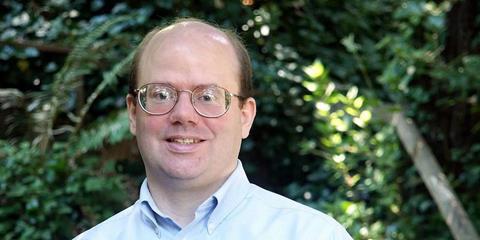Decades of his own in-depth study combined with the testimony of “intelligent Christians” helped moved Larry Sanger from agnostic to Christian. In a lengthy blog post published this week, the Wikipedia co-founder revealed what changed his mind on God’s existence. Here’s what you need to know

Larry Sanger has made it his life’s mission to seek truth.
The American co-founded Wikipedia, the epic online encyclopedia, in 2001. It is considered the largest and most-read collection of factual information in history. This vast platform of inter-connected references gives you an insight into how Larry’s mind works, and may explain why he has approached belief in God, or rather, his journey of skepticism, with such comprehensiveness.
Calling himself a ‘Skeptical Philosopher’ in his new blog about his 35 year-long conversion process, Larry’s philosophy in life, called ‘methodical skepticism’, was to firmly rule out any belief that he did not know “with certainty” to be true. But he essentially ran out of reasons and arguments why God does not exist, and his failure to hold on to his agnosticism led him to faith.
After a winding journey of deeply examining the best that atheism and skepticism had to offer, Larry was eventually converted to Christianity, and is now writing a 200,000 word (and counting) defence of the Christian faith, simply called God exists.
Interrogating agnosticism
Growing up with Christian parents and confirmed in the Lutheran Church aged 12, Larry could remember his early belief “slipping away” as his family left church and he began spending a great deal of time thinking and writing about various philosophical questions.
It came as “something of a discovery” that he did not seem to believe in God anymore, especially after being told by a pastor that he asked “too many questions”.
By the end of his teenage years he had decided to study philosophy and embark on his personal “truth-seeking” mission by building a philosophical system of his own - one that would lay firm rational foundations for the definition and discovery of truth - “rationalistic truth seeking”, as he refers to it. Essentially, truth that is objective and certain.
But Larry experienced disappointment in this field. In the mid 90s he left academia, saying he rarely saw “any sincere concern for truth”.
Larry decided to re-frame his search for truth around the belief in a deity. Confirming himself as an agnostic (as opposed to atheist) was a significant step.
“I was always willing to consider seriously the possibility that God exists. They [atheists] were not”, Larry explains.
“The atheists said that they simply lacked a belief that God exists, but their mocking attitude screamed that God indeed did not exist.”
“In my experience, the people who call themselves “atheists,” regardless of how they define this term, rarely take the possibility of God’s existence seriously.”
Re-discovering the Bible
The openness that Larry now had to the existence of God led him to interrogate apologetics, and arguments for a designer and creator of the universe - the ‘First Cause’ argument specifically. For Larry, these arguments stopped short at conclusively proving the God of the Bible exists.
By 2005 when Larry had stopped teaching philosophy and returned full time to Internet projects, his reasons for disbelief in God, one by one, began to fall away.
Firstly, he found himself opposed to the “obnoxiousness” of the growing anti-Christian tides in society.
“I had too much respect for Christian family and friends”, Larry writes. “Similarly, I observed Christians on social media often (though not always) behaving with maturity and grace, while their critics often acted like obnoxious trolls. Some of my favorite people were Christian, too. And some of them were extremely intelligent.”
“Perhaps, I had not given Christianity a fair shake”, he confessed.
But the final nail in the coffin of Larry Sanger’s dwindling resistance to belief in God, came when he began to study the Bible.
“I adopted the YouVersion Bible app”, Larry writes, “and immediately made Bible study a serious hobby.”
“I found the Bible far more interesting and—to my shock—coherent than I was expecting. I found it could sustain interrogation; who knew?”
A quiet conversion
At this point it dawned on Larry that what he was experiencing was Theology, and giving himself to this construct was a significant step.
“Theology is…what rational people do when they try to come to grips with the Bible in all its richness”, he points out.
With this discovery that the ideas and events in the Bible are part of a robust moral and historical framework holding them all together (theological doctrine) - the discovery that biblical faith could be based on coherent truth - Larry’s heart began to open. He started talking to God, which he cautiously classed as “experimental” after having lost his faith as a child.
“I (used to) occasionally pretend to dialogue with a supremely wise being about various issues in my life”, Larry writes, “of course aware that this is suspiciously like prayer”.
From this position of near conversion, Larry set out to re-examine the arguments for the existence of God. Then, as he began to read the gospels, he was converted “quiet and uncomfortable” to Christianity, and to praying “properly”. He believed and hoped with humble reflection that he had arrived at “something like an Orthodox Christian faith”, and through his writing intends to be a defender of the faith for other Christians around the world.
Larry’s blog also reveals his journey of learning and embracing the heart of Christianity in the form of surrender and humility. Though he is still working out his stance on certain denominations and his own ability to discourse with other believers - a journey which he is hoping will one day lead to joining a local church - he seems to have the self-awareness to make this aim a success.
“While I think I am called to worship with my fellow brothers and sisters in Christ, face to face, I am aware that my presence is probably going to be like, well, a bull in a china shop, if I am not very careful. For one thing, I still ‘ask too many questions.’”



































1 Reader's comment